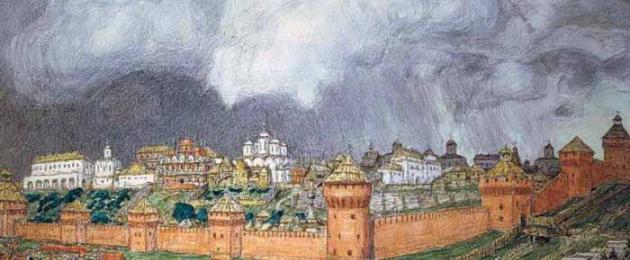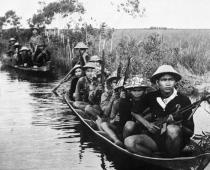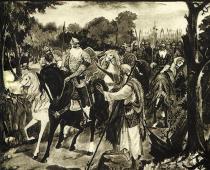The unusually rapid success of the Grand Duke Ivan III in collecting Russian lands was accompanied by significant changes in Moscow court life. The first wife of Ivan III, Princess Maria Borisovna of Tver, died early, in 1467, when Ivan was not even 30 years old. After her, Ivan had a son - Prince Ivan Ivanovich "Young", as he was usually called. At that time, relations between Moscow and Western countries were already being established. For various reasons, the pope was interested in establishing relations with Moscow and subordinating it to his influence. It was from the pope that the suggestion was made to arrange the marriage of the young Moscow prince with the niece of the last Emperor of Constantinople, Zoya-Sophia Palaiologos. After the capture of Constantinople by the Turks (1453), the brother of the murdered emperor Constantine Palaiologos, named Thomas, fled with his family to Italy and died there, leaving the children in the care of the pope. The children were brought up in the spirit of the Union of Florence, and the pope had reason to hope that by marrying Sophia to the Prince of Moscow, he would be able to introduce the union into Moscow. Ivan III agreed to start courtship and sent ambassadors to Italy for the bride. In 1472 she came to Moscow, and the marriage took place. However, the pope's hopes were not destined to come true: the papal legate who accompanied Sophia had no success in Moscow; Sophia herself did nothing to contribute to the triumph of the union, and thus the marriage of the Moscow prince did not entail any visible consequences for Europe and Catholicism. But it had some consequences for the Moscow court.
Ivan III's wife Sophia Paleolog. Reconstruction from the skull of S. A. Nikitin
Firstly, he contributed to the revival and strengthening of Moscow's relations with the West, which were beginning in that era, with Italy in particular. Together with Sophia, Greeks and Italians arrived in Moscow; they came later. The Grand Duke kept them as "masters", entrusting them with the construction of fortresses, churches and chambers, the casting of cannons, and the minting of coins. Sometimes diplomatic affairs were also entrusted to these masters, and they traveled to Italy with instructions from the Grand Duke. Traveling Italians in Moscow were called by the common name "fryazin" (from "friag", "franc"); thus, Ivan Fryazin, Mark Fryazin, Antony Fryazin, etc. acted in Moscow. Of the Italian masters, the most famous architect was Aristotle Fioravanti, who built the famous Assumption Cathedral and the Palace of Facets in the Moscow Kremlin.
Assumption Cathedral in the Moscow Kremlin
In general, the work of the Italians under Ivan III, the Kremlin was equipped and decorated anew. Next to the "Fryazh" masters, Ivan III also worked with German ones, although in his time they did not play the first role; only "German" doctors were issued. In addition to the masters, foreign guests appeared in Moscow (for example, the Greek relatives of Sophia) and ambassadors from Western European sovereigns. (By the way, the embassy from the Roman emperor offered Ivan III the title of king, which Ivan refused.) For the reception of guests and ambassadors at the Moscow court, a certain “rite” (ceremonial) was developed, completely different from the rank that was observed before at the receptions of the Tatar embassies. And in general, the order of court life under the new circumstances has changed, it has become more complicated and ceremonious.

A. Vasnetsov. Moscow Kremlin under Ivan III
Secondly, Moscow people attributed to the appearance of Sophia in Moscow great changes in the character of Ivan III and confusion in the princely family. They said that as Sophia came with the Greeks, so the land became confused and great disturbances came. The Grand Duke changed his treatment of those around him: he began to behave not as simply and accessible as before, demanded signs of respect for himself, became exacting and easily scorched (imposed disfavor) on the boyars. He began to discover a new, unusually lofty idea of his power. Having married a Greek princess, he seemed to consider himself the successor of the disappeared Greek emperors and hinted at this succession by adopting the Byzantine coat of arms - the double-headed eagle.

Moscow coat of arms at the end of the 15th century
In a word, after his marriage to Sophia, Ivan III showed great lust for power, which the Grand Duchess herself later experienced. At the end of his life, Ivan completely quarreled with Sophia and alienated her from himself. Their quarrel took place over the issue of succession to the throne. The son of Ivan III from his first marriage, Ivan the Young, died in 1490, leaving the Grand Duke a small grandson Dmitry. But the Grand Duke had another son from his marriage to Sophia - Vasily. Who was to inherit the throne of Moscow: grandson Dmitry or son Vasily? First, Ivan III decided the case in favor of Dmitry and at the same time imposed his disgrace on Sophia and Vasily. During his lifetime, he crowned Dmitry to the kingdom (namely on kingdom , and not for a great reign). But a year later, relations changed: Dmitry was removed, and Sophia and Vasily again entered mercy. Vasily received the title of Grand Duke and became co-ruler with his father. During these changes, the courtiers of Ivan III endured: with disgrace to Sophia, her entourage fell into disfavor, and several people were even executed by death; in disgrace to Dmitry, the Grand Duke also raised a persecution of some of the boyars and executed one of them.
Remembering everything that happened at the court of Ivan III after his marriage to Sophia, the people of Moscow condemned Sophia and considered her influence on her husband more harmful than useful. They attributed to her the fall of old customs and various novelties in Moscow life, as well as the damage to the character of her husband and son, who became powerful and formidable monarchs. However, one should not exaggerate the significance of Sophia's personality: if she had not been at the Moscow court at all, all the same, the Moscow Grand Duke would have realized his strength and sovereignty, and relations with the West would still have begun. The whole course of Muscovite history led to this, by virtue of which the Grand Duke of Moscow became the sole sovereign of the mighty Great Russian people and a neighbor of several European states.
- In contact with 0
- Google Plus 0
- OK 0
- Facebook 0








